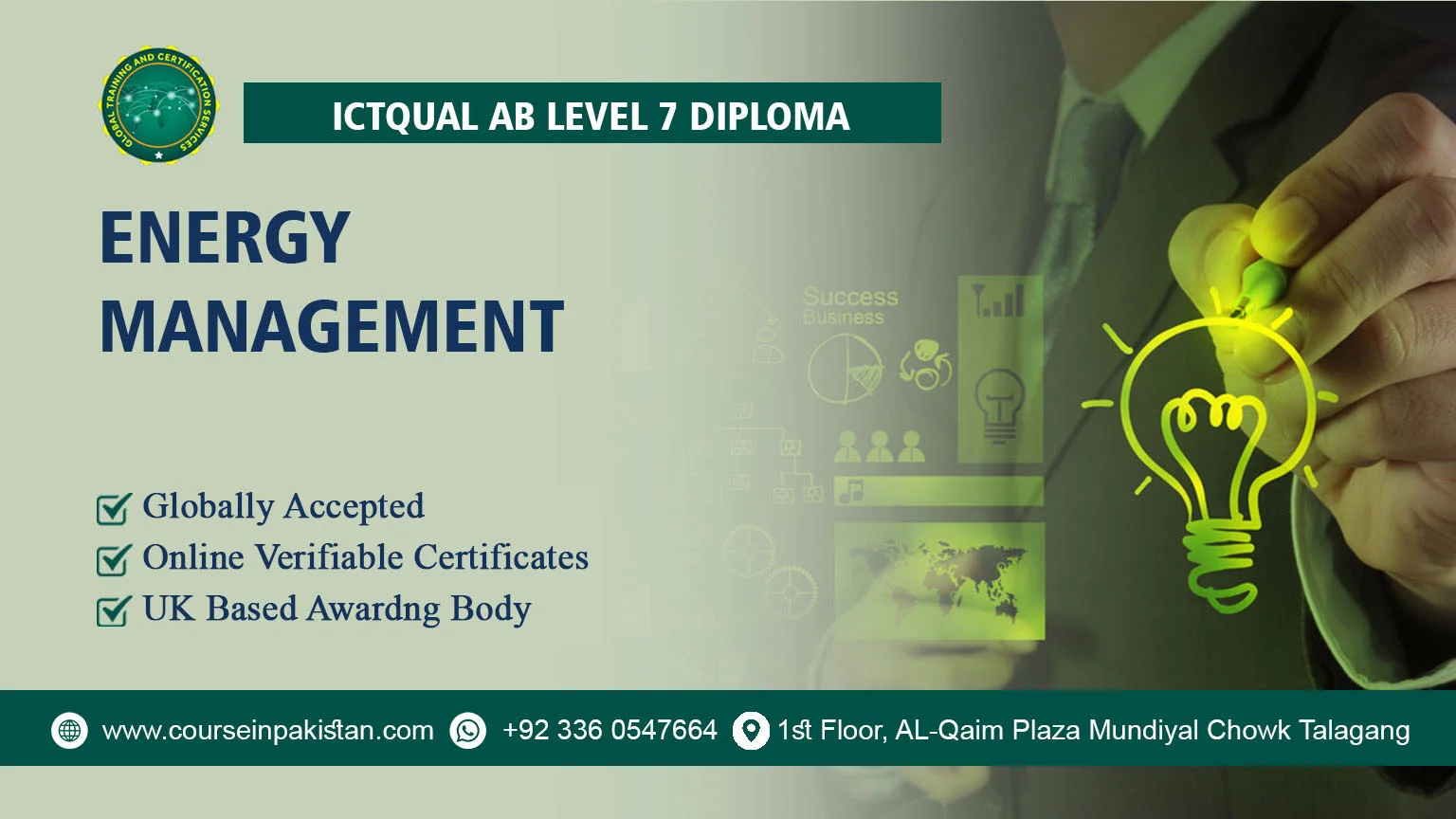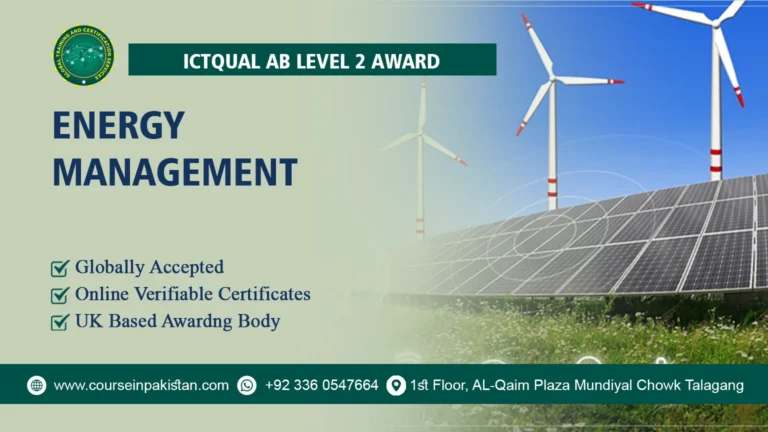
ICTQual Level 7 Diploma in Energy Management
In an era where sustainability and efficiency are paramount, the Level 7 Diploma in Energy Management emerges as a pivotal qualification for professionals aiming to lead the charge towards energy conservation and optimal resource utilization. This advanced diploma not only equips participants with profound knowledge but also empowers them to implement strategic initiatives that drive environmental responsibility and operational efficiency within organizations.
Course Introduction
The Level 7 Diploma in Energy Management is designed to provide comprehensive expertise in managing energy resources effectively across industrial, commercial, and residential sectors. It focuses on equipping participants with advanced skills to analyze energy consumption patterns, implement sustainable practices, and navigate regulatory frameworks.
Course Overview
Participants delve into a diverse range of topics essential for effective energy management:
- Energy Efficiency Strategies: Implementing technologies and practices to optimize energy use and reduce carbon footprint.
- Renewable Energy Integration: Exploring the integration of renewable energy sources to diversify energy portfolios and enhance sustainability.
- Energy Auditing and Monitoring: Conducting comprehensive audits and monitoring systems to identify inefficiencies and implement improvements.
- Policy and Regulatory Compliance: Understanding national and international energy policies, regulations, and incentives affecting energy management practices.
Course Benefits
- Advanced Expertise: Gain in-depth knowledge and skills to lead energy management initiatives within organizations.
- Career Advancement: Enhance career prospects with a recognized qualification that demonstrates leadership in sustainability and energy management.
- Operational Efficiency: Implement strategies to optimize energy use, reduce costs, and enhance organizational efficiency.
- Environmental Impact: Contribute to environmental stewardship by implementing sustainable energy practices and reducing carbon emissions.
Course Study Units
The Level 7 Diploma in Energy Management typically includes study units such as:
- Introduction to energy management
- Technical and Operational
- Behavioural Change and Motivation
- Waste Management
- Transport
- Water
- Procurement
- Information & Communications Technology
- Energy Assessments, Measurements and Verification
- Regulatory & Legal Compliance and Carbon Management
- Strategy/Plan in energy management
Learning Outcomes
Introduction to Energy Management
- Learning Outcomes:
- Understand the fundamental principles and concepts of energy management.
- Gain awareness of global energy challenges and the importance of sustainable energy practices.
- Identify key stakeholders and their roles in energy management within organizations.
Technical and Operational
- Learning Outcomes:
- Acquire technical knowledge of energy systems, including generation, distribution, and utilization.
- Analyze energy consumption patterns and identify opportunities for energy efficiency improvements.
- Implement technical solutions to optimize energy use and reduce operational costs.
Behavioural Change and Motivation
- Learning Outcomes:
- Understand human behavior dynamics related to energy consumption and conservation.
- Develop strategies to promote behavioral change and motivate individuals or teams to adopt energy-saving practices.
- Implement communication techniques and engagement strategies to foster a culture of energy efficiency within organizations.
Waste Management
- Learning Outcomes:
- Explore waste management practices and their impact on energy consumption.
- Integrate waste reduction strategies with energy management initiatives to achieve overall sustainability goals.
- Implement waste-to-energy solutions and evaluate their effectiveness in reducing environmental footprint.
Transport
- Learning Outcomes:
- Assess energy consumption and emissions associated with transportation systems.
- Develop transportation management strategies to reduce fuel consumption and carbon emissions.
- Integrate sustainable transport solutions into overall energy management plans.
Water
- Learning Outcomes:
- Understand the nexus between water and energy usage.
- Implement water conservation measures to reduce energy-intensive water treatment processes.
- Optimize water management practices to achieve energy efficiency and sustainability goals.
Procurement
- Learning Outcomes:
- Analyze the impact of procurement decisions on energy consumption and sustainability.
- Implement energy-efficient procurement strategies and guidelines.
- Evaluate suppliers based on their energy management practices and sustainability criteria.
Information & Communications Technology
- Learning Outcomes:
- Utilize ICT tools and technologies to monitor and manage energy consumption.
- Implement energy-efficient ICT solutions and practices.
- Optimize data management and analysis for improved energy performance and decision-making.
Energy Assessments, Measurements and Verification
- Learning Outcomes:
- Conduct comprehensive energy assessments and audits to identify energy-saving opportunities.
- Utilize measurement and verification (M&V) techniques to quantify energy savings and verify performance.
- Develop and implement action plans based on assessment findings to achieve energy efficiency goals.
Regulatory & Legal Compliance and Carbon Management
- Learning Outcomes:
- Understand regulatory requirements and legal frameworks related to energy management and carbon emissions.
- Develop strategies to ensure compliance with energy-related regulations and carbon management initiatives.
- Implement carbon reduction strategies and initiatives to mitigate environmental impact and achieve sustainability targets.
Strategy/Plan in Energy Management
- Learning Outcomes:
- Develop comprehensive energy management strategies and plans aligned with organizational goals.
- Integrate energy efficiency measures and renewable energy solutions into strategic planning.
- Monitor and evaluate the effectiveness of energy management strategies to continuously improve performance and achieve sustainability objectives.
These learning outcomes are designed to equip professionals with the knowledge and skills necessary to effectively manage energy resources, implement sustainable practices, and achieve operational efficiency within organizations.
Who Is This Course For?
The Level 7 Diploma in Energy Management is ideal for:
- Energy Managers and Consultants: Seeking to advance their expertise in managing energy resources effectively.
- Environmental Engineers and Sustainability Officers: Responsible for implementing sustainable practices and energy efficiency strategies.
- Facility Managers and Operations Directors: Interested in optimizing energy use and reducing operational costs within facilities.
- Policy Makers and Regulatory Compliance Specialists: Focused on understanding and implementing energy policies and regulations.
Future Progression for This Course
Graduates of the Level 7 Diploma in Energy Management can pursue various avenues for career progression, including:
- Master’s Programs: Advance into specialized master’s degrees in fields such as Energy Management, Sustainable Energy, or Environmental Management.
- Executive Leadership Roles: Take on senior leadership positions within organizations, driving energy management strategies and sustainability initiatives.
- Consultancy and Advisory Services: Offer expertise as energy consultants or advisors to businesses, governments, and NGOs.
- Research and Innovation: Contribute to research and development in renewable energy technologies, energy efficiency, and sustainability practices.
The Level 7 Diploma in Energy Management is more than just a qualification; it’s a gateway to shaping a sustainable future. By equipping professionals with advanced skills in energy management, this diploma empowers them to lead impactful initiatives that optimize energy use, reduce costs, and mitigate environmental impact. Embrace the opportunity to drive change and excel in the dynamic field of energy management, paving the way for a more sustainable tomorrow.






